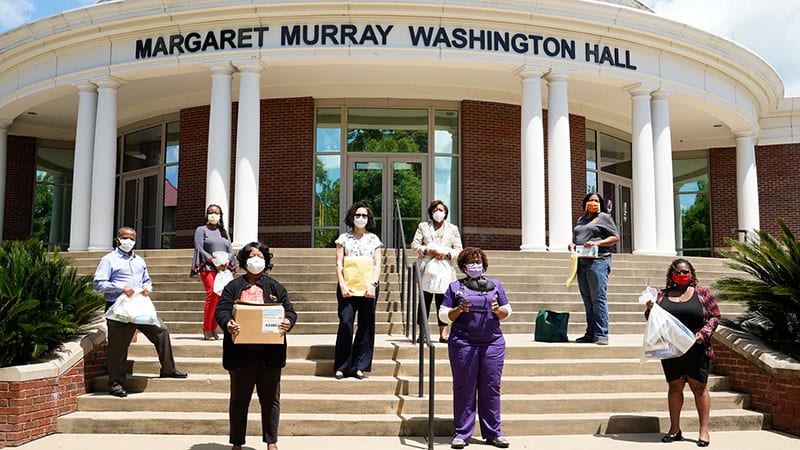Tuskegee University Supplying Healthcare Workers, First Responders with PPE Equipment

With medical supplies dwindling, Tuskegee faculty gather surplus masks, gloves and other protective equipment for use by frontline workers in underserved medical communities.
With hospitals and medical facilities across the country running low on key personal protective equipment, or PPEs, in the wake of the coronavirus pandemic, Tuskegee University is directing this much-needed gear to local healthcare providers and first-responders. [Tuskegee University is a UNCF-member institution.]
University leaders and faculty pulled together more than 500 N95 masks, surgical masks, face shields, bonnets, shoe coverings, gloves, goggles and protective gowns from labs across campus for use by Prime Care Medical Center. Dr. Deloris Alexander, an associate professor and director of Tuskegee’s Integrative Biosciences Ph.D. Program, recognized this opportunity to address rural community PPE needs and to help frontline medical and emergency-response professionals remain safe.
“This all started as part of the university’s Community Health Task Force, commissioned in the earliest days of the coronavirus to monitor and react to the virus’ spread,” explained Alexander, who is also a Tuskegee native and university alumna. “We saw a need to partner with our community during this pandemic and noted that donating PPE would have a dramatic impact on preventing the virus’ spread.”
The nationwide shortage of medical PPE has been well documented by the news media, as well as through governmental directives to corporations to retool manufacturing processes to develop more of these items. The need is so dire that some hospitals are having to recycle or ration PPE supplies as their availability decrease but the number of COVID-19 cases increases.
Dr. Deanah Maxwell Stafford of Prime Care Medical Center, received the donation on behalf of local health care providers. Dr. Maxwell cited the importance of the donation as a crucial factor in outpatient practices being able to remain open during this time. According to Maxwell Stafford, “PPE is necessary to protect both patients and healthcare staff. I am grateful to the University for this show of support.“
The university’s response is in part to provide resources to communities like those in Macon County that suffer from systemic health disparities and a lack of adequate medical funding and emergency medical facilities.
“In a time when the relevance and need for historically black colleges and universities has been questioned by state and federal leaders, Tuskegee is working to fulfill for its neighbors and the broader healthcare infrastructure its land-grant mission focused on service,” added Dr. Ruby L. Perry, acting president and dean of the College of Veterinary Medicine.
Dr. Rueben C. Warren, director of the National Center for Bioethics in Research and Health Care at Tuskegee University agreed—citing needs for better advocacy for communities of color and creating greater trust among the residents of those communities of their local medical systems.
“There absolutely is an added responsibility on us to bring assurances to our communities and to advocate for our communities,” Warren recently told NBC News. “In fact, we are not only obligated, but we have a desire to make sure that equity exists. Historically, that has not happened, which is a concern.”
Alexander explained that university faculty continue to maintain a small PPE stockpile in order to respond more rapidly to future needs should the pandemic linger.
“It took us two weeks to gather our initial donation. With an available stockpile, we could respond to local requests in hours instead of weeks,” she explained.
Alexander noted support for the initiative came from the university’s Community Health Task Force co-chairs—Dr. Kimberly Scott, vice president for student affairs, and Crystal James, Esq., head of the Department of Graduate Public Health—and Acting President Ruby L. Perry. She credits many faculty and administrators representing the university’s various colleges and schools with amassing the initial stockpile. Those include the College of Agriculture, Environment and Nutrition Science; College of Arts and Sciences; College of Engineering; School of Nursing and Allied Health; and College of Veterinary Medicine.
Individuals or businesses that would like to contribute PPE supplies they may have on hand to the university’s stockpile can email Alexander at ppe@tuskegee.edu.
Information about the university’s continuing response to the coronavirus pandemic is available at www.tuskegee.edu/coronavirus-resources.